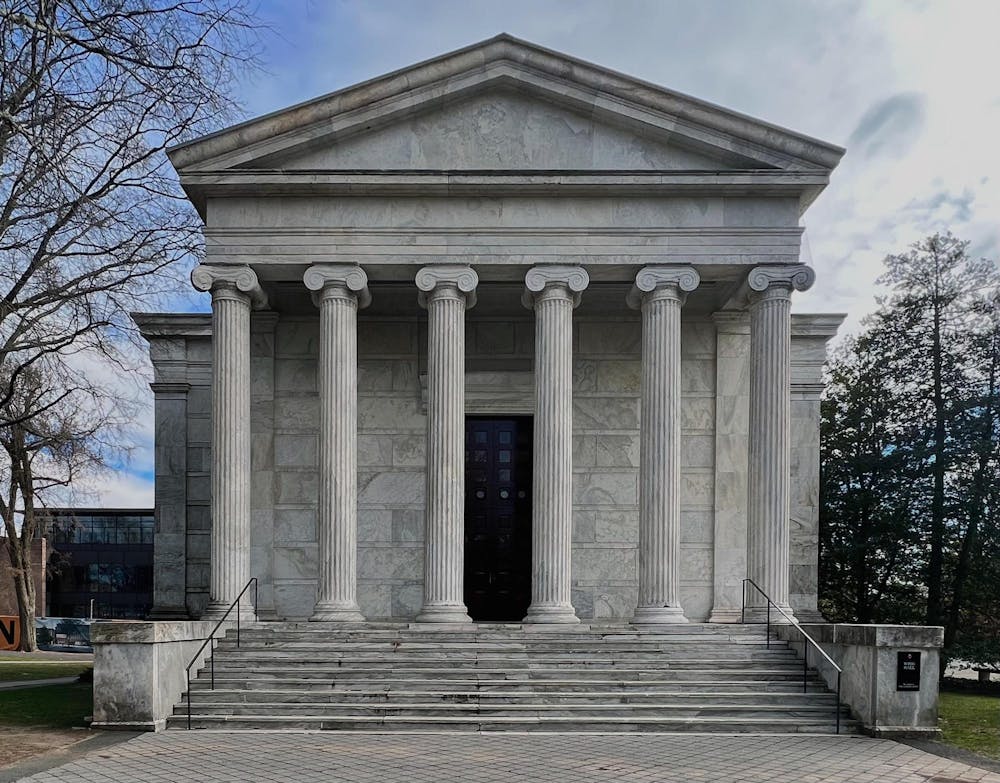In the wake of Charlie Kirk’s assassination, the Heritage Foundation, one of America’s most prominent right-wing think tanks, abruptly canceled a lecture at Princeton scheduled for Sept. 16, citing security concerns. The event was originally scheduled to feature Wilson Beaver, the Heritage Foundation’s Senior Policy Advisor for Defense Budgeting and NATO Policy, but was pulled just days before it was set to take place.
“Heritage made this decision out of an abundance of caution as it reviews its personnel security policies following the recent assassination of Charlie Kirk,” the American Whig-Cliosophic Society (Whig-Clio) said in a statement online.
The cancellation at Princeton appears to be the first time that Heritage, one of the most prominent right-wing think tanks in America and the birthplace of Project 2025, has pulled a speaker from a college campus since Kirk’s death. Heritage did not respond to a request for comment in time for publication.
“We’re still committed to bringing speakers on various sides of the conservative spectrum,” President of the Cliosophic Society (Clio) William Neumann ’27 told The Daily Princetonian. “We’re not going to be afraid or intimidated.”
Campus leaders across the political spectrum joined in condemning the killing. “The assassination of Charlie Kirk is abhorrent — it’s political violence, it’s antithetical to everything Whig-Clio stands for, it’s antithetical to everything this country is about,” Samuel Kligman ’26, President of Whig-Clio, told the ‘Prince.’
Kligman, who identifies as liberal, added, “We need to look past our differences, or at least be able to grapple with our differences without being at each other’s throats.”
The Princeton Open Campus Coalition (POCC) also weighed in on Kirk’s assassination. “The best way to pay our respects to the late Charlie Kirk, and indeed the best way to honor the mission of the university and the principles of our nation, is to see the humanity in the person on the other side of the debate,” the POCC wrote in a statement sent to residential college listservs on Sept. 11.
Alongside denouncing the assassination itself, many community members voiced concerns about the implications of Kirk’s death to political dialogue and expression, particularly with regard to conservative thought on campus.

“The first reaction I had was shock,” Joshua Jen ’28, a member of Clio, told the ‘Prince.’ “After seeing the video, then getting more updates, I think I was honestly very sad; it was just very telling of our current political atmosphere.”
“Hopefully, it’s more of a short-term thing,” Jen said, addressing speaker cancellations. “But there is some consideration about security now, especially for people who are more conservative or a little bit more controversial.”
At a Sept. 16 panel titled “What the Assassination of Charlie Kirk means for America,” hosted by the James Madison Program, Professor Robert P. George underscored the importance of constructive dialogue.
“It’s critically important that there be role models, and especially on the left, but really on both sides,” George told the audience of more than 100 attendees.

George, who appeared on Kirk’s show in April 2025, added that it was important for conservatives to “stand up for Charlie Kirk’s way” of modeling civil discourse, persuasion, and argument.
Nationwide, political violence is on the rise, committed by people from a range of ideologies. On the day of Kirk’s shooting, Sept. 10, the Bridging Divides Initiative (BDI), a non-partisan research program at Princeton, released a discussion paper about combatting political violence with community safety and de-escalation approaches. One key finding was that funding and policies that support community safety have not kept pace with growing demand nationwide.
“The advent of social media has made it easier for people to threaten or even advocate violence from a distance with fewer repercussions,” Shannon Hiller GS ’15, the executive director of BDI, told the ‘Prince.’
Hiller said that these factors — combined with the use of dehumanizing rhetoric by political leaders, persistent threats and harassment, limited mental health support, and the widespread availability of weapons — have created “a really risky environment” that has contributed to politically motivated violence in the past few months.
The initiatives also virtually hosted “Community Safety and De-Escalation Approaches to Mitigating Political Violence” on Sept. 18, where leading practitioners discussed improving safety and security tools and training.
The University works with student organizations on a case-by-case basis to determine security needs and ensure proper support for “safe and successful events,” University spokesperson Jennifer Morrill said in a statement.
Neumann emphasized that Kirk’s killing happened on a college campus, “which is supposed to be a sanctuary of freedom of expression, of safety, and of respect.”
“I feel the repercussions would be pretty broad for conservative speaker events,” he added.
Still, Kligman believes that the campus climate has mostly been hospitable to civic discourse.
“In general, people at Princeton — whether that be students, faculty members, or members of the town community — are all willing to be respectful and be civil,” he said. “I don’t know what’s going to happen on campus going forward, but I’m hopeful.”
Sena Chang is a senior News writer for the ‘Prince.’ She typically covers campus and community activism, the state of higher education, and alumni news.
Please send any corrections to corrections[at]dailyprincetonian.com.








